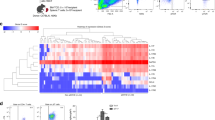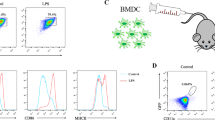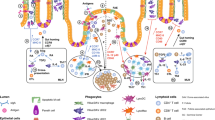Abstract
Inflammatory bowel disease (IBD) is caused by an uncontrolled immune response in the intestinal lumen, leading to inflammation in genetically predisposed individuals. Immunotherapy may be a promising approach to the treatment of IBD. Here, we show that transforming growth factor-β1 (TGF-β1) gene-modified immature dendritic cells (imDCs) could enhance the inhibitory function of imDCs and delay the progress of IBD induced by dextran sodium sulfate in mice. The results of fluorescence-activated cell sorter (FACS) demonstrated that this protective effect is mediated partially by inducing CD4+Foxp3+ regulatory T cells (Tregs) in mesentery lymph nodes to control inflammation. In vitro experiments also supported this hypothesis. In conclusion, we provide evidence that TGF-β1-modified bone marrow-derived imDCs may have a therapeutic effect to IBD.
This is a preview of subscription content, access via your institution
Access options
Subscribe to this journal
Receive 12 digital issues and online access to articles
$119.00 per year
only $9.92 per issue
Buy this article
- Purchase on SpringerLink
- Instant access to full article PDF
Prices may be subject to local taxes which are calculated during checkout







Similar content being viewed by others
References
Papadakis KA, Targan SR . Role of cytokines in the pathogenesis of inflammatory bowel diseases. Annu Rev Med 2000; 51: 289–298.
Loftus EV Jr . Clinical epidemiology of inflammatory bowel disease: incidence, prevalence, and environmental influences. Gastroenterology 2004; 126: 1504–1517.
Yu Y, Sitaraman S, Gewirtz AT . Intestinal epithelial cell regulation of mucosal inflammation. Immunol Res 2004; 29: 55–68.
Kuhbacher T, Fölsch UR . Practical guidelines for the treatment of inflammatory bowel disease. World J Gastroenterol 2007; 13: 1149–1155.
Pepper MS . Transforming growth factor-beta: vasculogenesis, angiogenesis and vessel wall integrity. Cytokine Growth Factor Rev 1997; 8: 21–43.
Blobe GC, Schiemann WP, Lodish HF . Role of transforming growth factor beta in human disease. N Engl J Med 2000; 342: 1350–1358.
Lawrance IC, Maxwell L, Doe W . Inflammation location, but not type, determines the increase in TGF-beta1 and IGF-1 expression and collagen deposition in IBD intestine. Inflamm Bowel Dis 2001; 7: 16–26.
Banchereau J, Steinman RM . Dendritic cells and the control of immunity. Nature 1998; 192: 245–252.
Steinman RM, Hawiger D, Nussenzweig MC . Tolerogenic dendritic cells. Annu Rev Immunol 2003; 21: 685–711.
Wallet MA, Sen P, Tisch R . Immunoregulation of dendritic cells. Clin Med Res 2005; 3: 166–175.
Zhang MH, Tang H, Guo ZH, An HZ, Zhu XJ, Song WG, et al. Splenic stroma drives mature dendritic cells to differentiate into regulatory dendritic cells. Nat Immunol 2004; 5: 1124–1133.
Aharonia R, Sonegoa H, Brennerb O, Eilamb R, Arnon R . The therapeutic effect of glatiramer acetate in a murine model of inflammatory bowel disease is mediated by anti-inflammatory T-cells. J Pharmacol Exp Ther 2006; 318: 68–78.
Sun WJ, Wang QX, Zhang LH, Pan JP, Zhang M, Lu GH, et al. TGF-β1 gene modified immature dendritic cells exhibit enhanced tolerogenicity but induce allograft fibrosis in vivo. J Mol Med 2002; 80: 514–523.
Steinbrink K, Wolfl M, Jonuleit H, Knop J, Enk AH . Induction of tolerance by IL-10-treated dendritic cells. J Immunol 1997; 159: 4772–4780.
Trinchieri G . Interleukin-12 and the regulation of innate resistance and adaptive immunity. Nat Rev Immunol 2003; 3: 133–146.
Wing K, Fehervari Z, Sakaguchi S . Emerging possibilities in the development and function of regulatory T cells. Int Immunol 2006; 18: 991–1000.
Podolsky DK . Inflammatory bowel disease. N Engl J Med 2002; 347: 417–429.
Leehler R, Ng WF, Steinman RM . Dendritic cells in transplantation: friend or foe? Immunity 2001; 14: 357–368.
Jong EC, Smits HH, Kapsenberg ML . Dendritic cell-mediated T cell polarization. Springer Semin Immunopathol 2005; 26: 289–307.
Thomson AW, Lu L, Murase N, Demetris AJ, Rao AS, Starzl TE . Microchimerism, dendritic cell progenitors and transplantation tolerance. Stem Cells 1995; 13: 622–639.
Placek K, Coffre M, Maiella S, Bianchi E, Rogge L . Genetic and epigenetic networks controlling T helper 1 cell differentiation. Immunology 2009; 127: 155–162.
Cooper HS, Murthy SN, Shah RS, Sedergran DJ . Clinicopathologic study of dextran sulfate sodium experimental murine colitis. Lab Invest 1993; 69: 238–249.
Sauer S, Bruno L, Hertweck A, Finlay D, Leleu M, Spivakov M, et al. T cell receptor signaling controls Foxp3 expression via PI3K, Akt, and mTOR. Proc Natl Acad Sci USA 2008; 105: 7797–7802.
Acknowledgements
We thank Professor Lin-Rong Lu for his critical review of the manuscript. This work was supported by the National Key Basic Research Program of China (Grant 2007CB512400), the National High Technology Research and Development Program of China (Grants 2006AA02A239 and 2007AA021102), the National Natural Science Foundation of China (Grant 30671909 and 30972725) and Natural Science Foundation of Zhejiang Province (Z2090042).
Author information
Authors and Affiliations
Corresponding author
Rights and permissions
About this article
Cite this article
Cai, Z., Zhang, W., Li, M. et al. TGF-β1 gene-modified, immature dendritic cells delay the development of inflammatory bowel disease by inducing CD4+Foxp3+ regulatory T cells. Cell Mol Immunol 7, 35–43 (2010). https://doi.org/10.1038/cmi.2009.107
Received:
Revised:
Accepted:
Published:
Issue Date:
DOI: https://doi.org/10.1038/cmi.2009.107
Keywords
This article is cited by
-
Post-transcriptional regulator Rbm47 elevates IL-10 production and promotes the immunosuppression of B cells
Cellular & Molecular Immunology (2019)
-
CD69 enhances immunosuppressive function of regulatory T-cells and attenuates colitis by prompting IL-10 production
Cell Death & Disease (2018)
-
Human macrophages induce CD4 + Foxp3 + regulatory T cells via binding and re‐release of TGF‐β
Immunology & Cell Biology (2016)
-
Generation of regulatory dendritic cells after treatment with paeoniflorin
Immunologic Research (2016)
-
Effect of bone marrow-derived CD11b+F4/80+ immature dendritic cells on the balance between pro-inflammatory and anti-inflammatory cytokines in DBA/1 mice with collagen-induced arthritis
Inflammation Research (2014)



